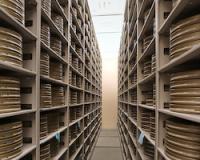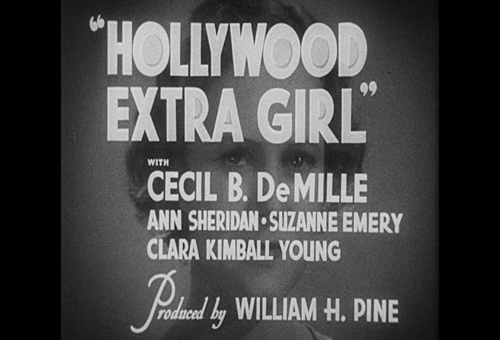
Hollywood Extra Girl (c. 1935)
From November 9-12, motion picture and recorded sound archivists and professionals from around the world convene in Pittsburgh, PA for the annual Association of Moving Image Archivists (AMIA) conference. UCLA Film & Television Archive will be represented by Susan Etheridge, Jan-Christopher Horak, Mark Quigley and Todd Wiener, who will speak on a variety of subjects.
Details below provided by AMIA:
Black Films & Blu-ray: Strategies for Producing Home Video Packages
Thursday, Nov. 10 at 11 a.m.
Speakers: Jan-Christopher Horak, UCLA Film & Television Archive; Ron Magliozzi, Museum of Modern Art; Amy Heller, Milestone Films. Chair: Jacqueline Stewart, University of Chicago.
Home video packages offer exciting opportunities to provide wide access to archival collections. This panel features presentations by archivists, curators, distributors and scholars who have worked on recent DVD and Blu-ray projects. Panelists will describe every step of the process: what it takes to fund, research, curate, package, release and market home video packages. They will describe the technical issues involved in “restoring” and digitizing film elements for the purposes of disc and streaming presentation, and explain issues such as remastering and frame rate adjusting. They will also talk about the “extras” these packages enable, from music and commentary soundtracks to interviews, still images, and other primary documents. The panel’s focus on African-American film packages will open up the conversation to consider the benefits and challenges of working with materials that have received scant archival, scholarly and public attention, and strategies for reaching diverse audiences. UCLA Film & Television Archive director Jan-Christopher Horak will discuss the recent release of L.A. Rebellion: Creating a New Black Cinema, a compilation of 25 short works produced by L.A. Rebellion filmmakers, available for free for educational use.
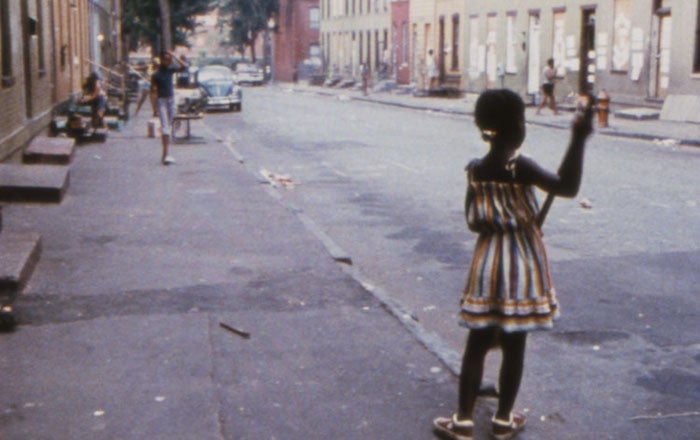
Brick by Brick (1982)
Quad at 60: Preserving Local 2” Videotape,” Launched in April 1956
Friday, Nov. 11 at 9:30 a.m.
Speakers: Mark Quigley, UCLA Film & Television Archive. Chair: Jeff Martin, Archival Moving Image Consulting.
Launched in April 1956, 2” quad videotape became the dominant broadcast format for more than two decades. Networks were the first adopters, but as early as 1958 local stations were taping their own programming—everything from documentaries to breaking news to performances by local musicians. The economics of 2” tape, however, meant that tapes were frequently re-used by local producers, and thus are now relatively rare. This session, marking the 60th Anniversary of videotape, will give a technical and historical overview of the format, but more importantly, showcase a diverse array of newly-discovered and preserved local programming that originated on 2”, from stations across the country. Archive Research & Study Center manager Mark Quigley will discuss local public service programs produced on tape relevant to marginalized communities and preserved by UCLA Film & Television Archive, including Canción de la raza (KCET, 1968), a drama which explores the Chicano walkouts in Los Angeles.
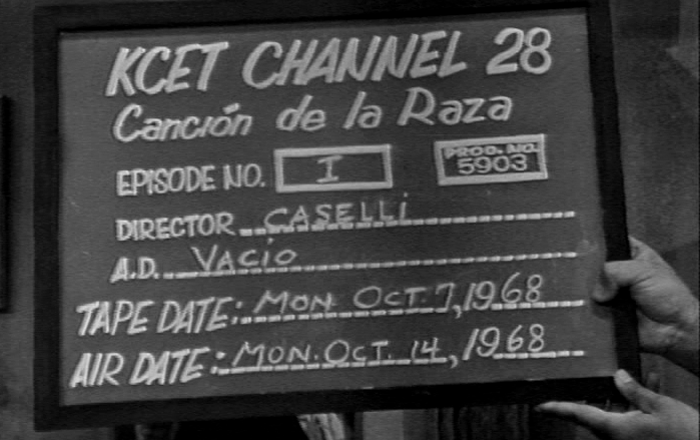 Canción de la raza (1968)
Canción de la raza (1968)
Don’t Sell Shorts Short: Preserving and Curating Shorts Collections
Friday, Nov. 11 at 2 p.m.
Speakers: Todd Wiener, UCLA Film & Television Archive; Helen Edmunds, BFI National Archive; Mike Mashon, Library of Congress. Chair: Laura Thornburg, Paramount Pictures.
Short subject collections represent a tremendous range of eras, genres, subjects, technologies…and challenges. The panel will delve into both historical context and practical issues of managing a large collection of short features. Perspectives will come both from private/corporate archives and larger public archives, and will cover cataloging, rights issues, preservation, access and programming. Specific case studies will be included, as will examples of rare, preserved titles.
From Hearst Metrotone newsreels to LGBT activist films, Julie Dash to Kenneth Anger, UCLA Film & Television Archive has preserved just as many short subjects as features, but in 2015 many of these under-appreciated gems made up less than 20% of the Archive’s extensive print loan program. Motion picture archivist Todd Wiener will discuss the Archive’s successes as well as the curatorial and programmatic challenges issues surrounding accessing and loaning short subjects. Examples of preserved titles include In a Mountain Pass and Barcarolle (both part of the rare "Musical Moods" series), Hollywood Make-Up Magic (1942) and Hollywood Extra Girl (c. 1935), a promo film for Cecil B. DeMille's The Crusades (1935).
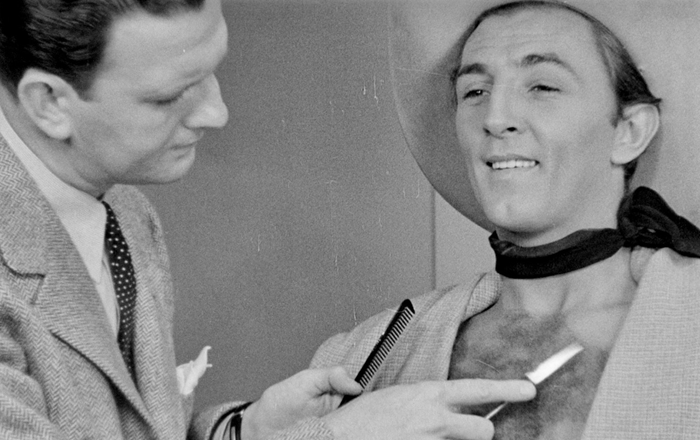
Hollywood Make-Up Magic (1942)
Opportunity, Law, and Ethics: Researching, Contextualizing, and Recirculating Nontheatrical Films
Saturday, Nov. 12 at 11 a.m.
Speakers: Mark Quigley, UCLA Film & Television Archive; Skip Elsheimer, A/V Geeks; Brian L. Frye, University of Kentucky College of Law; Mark Williams, Dartmouth College. Chairs: Marsha Gordon, North Carolina State University; Allyson Nadia Field, University of Chicago.
This panel brings together archivists and scholars to discuss the process of identifying, finding, working with, and documenting the filmmakers, subjects, and other personnel involved in producing nontheatrical films. Through specific cases and representative anecdotes, panelists will focus on the opportunities, challenges, legal issues, and ethics involved in such work. We will also explore the use of technological tools (such as the Media Ecology Project and other database systems) in working with nontheatrical film and how we might best go about the labor of documenting hitherto undocumented films, which often suffer from a unique form of neglect and a lack of context that differentiates them from most of their their theatrical counterparts. More of a discussion session than a series of formal presentations, each panelists will briefly share some experiences regarding the overarching panel topic and will then take place in a discussion, including participation from attendees, with regard to best practices for archivists and scholars working with undocumented nontheatrical film history. Archive Research & Study Center manager Mark Quigley will discuss UCLA Film & Television Archive's collection of works by writer-director Rolf Forsberg, an auteur of sponsored films, whose controversial and acclaimed Parable (1964) was named to the National Film Registry.
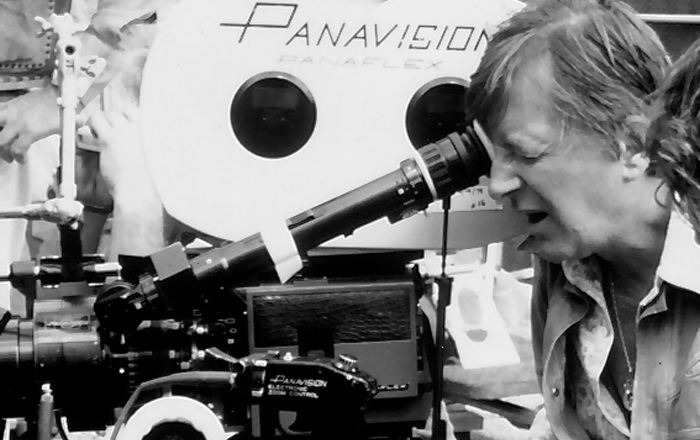
Rolf Forsberg
Further Freaky Film Formats: Mad Scientists Edition
Saturday, Nov. 12 at 3:30 p.m.
Speakers: Susan Etheridge, UCLA Film & Television Archive; Dino Everett, USC Hugh M. Hefner Moving Image Archive; Marsha Gordon, NCSU. Chair: Snowden Becker, UCLA Dept. of Information Studies.
This panel will focus on the Dr. Frankenstein types who recombined film production technologies and formats in surprising new ways, including: John Cunningham’s 9.5mm Kinemacolor process, with separate 16mm mag soundtrack; Martin Harper’s two-films-in-one process, with 35mm soundtracks on 16mm film; the 8mm Cinemascope achievements of Richard Orton, Paul Grenadier, and their Erector set anamorphic antics.
See the complete AMIA Conference schedule.
< Back to the Archive Blog






 Mobile Navigation
Mobile Navigation
